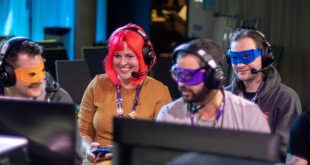 Chris McCarthy, head of recruitment at Third Kind Games tells us about what their people-first studio is like, and what sort of people they’re looking for.
Chris McCarthy, head of recruitment at Third Kind Games tells us about what their people-first studio is like, and what sort of people they’re looking for.
What differentiates your studio from other developers?
We’re one of the largest independent studios in the UK, but one that has stayed true to our values since our beginning. Supporting our team at TKG is one of our top priorities, with a flat structure and no micro-management. We really aim to empower our team in all areas of their working lives, including an active focus on creating and implementing benefits that are people and family centric, and truly fit with the lifestyle of our team. We also may be biased but … we’re pretty sure we have the best collection of game dev pets ever.
How many staff are you currently looking to take on?
We’re currently looking for ten people.
What perks are available to working at your studio?
We have a totally hybrid approach to work, and if you want to be in the studio we are in a fantastic inspiring location. We want to support our people in their career development and have personal training days to support that combined with career planning. Our additional benefits include annual pay reviews, great healthcare and a pension.
We are a pet friendly studio, meaning that you can have your furry or furless friend accompany you to the studio and share the love and cuddles, whilst also being able to be in the studio if you wish.
What should aspiring devs do with their CV to get an interview?
A lot of candidates are trying too hard with their CV’s to make them stand out, so we do see some unique layouts and visuals which actually make a CV a lot harder to read. Hiring managers just don’t have the time. Keep it simple and compact, but don’t sell yourself short. Don’t forget your CV is your prompt for preparing for that interview, so put all your successes and tangible achievements in there. For graduates, put all of your work experience in there. Quite often grads omit that but it is important to demonstrate that you have worked, can contribute and be part of a team!
What advice would you give for a successful interview at your studio?
Be yourself! Also, if you have not had an interview for some time, use your personal mobile to video yourself answering some of the obvious questions you will get at an interview. Just see how you come across. It’s very tough but you’ll realise you can answer a question in more detail. Answer the same question two or three times, and you’ll make an immediate impact on your answers. Oh, and interviews are also a two-way process – don’t forget to have your own questions prepared!
Who was the best interviewee you have ever had and how did they impress you?
Our strongest candidates listen and answer the question in a precise but relevant manner. They also have the ability to translate technical jargon into good straightforward language that anyone can understand.
If you have recruited internationally, what is the process like?
This is an interesting area, as there are lots of risks associated. Although the process may seem straightforward from a Visa perspective and the legalities, people forget that there is a huge turmoil in relocating from one country to another, so we make sure the candidate has lots of support and takes steps to make sure they fully understand the culture and role. It’s a costly process if this fails.
What processes do you have for onboarding staff remotely?
All new team members go through a personal and ‘high-touch’ process when joining TKG, whether remotely or in-person onboarding. All new team members are introduced to their immediate team first and then over the course of their first few weeks with us, they meet as many team members as possible to break the ice and get settled in. They also get an awesome welcome package of merch, too!
What is the culture like at your studio?
Our priority has always been people first and foremost, we have built our culture around being people first and our benefits, policies and ways of working aim to put people at the heart of everything we do. We recognise that it’s important for everyone to feel like they are progressing in their careers, and we aim to develop our talent and support them to progress both vertically and laterally.
We also work incredibly hard to advise and educate the next generation of game devs. In the first six months of 2023 we have visited more than 20 schools, colleges and universities to help local students understand the variety of roles within game development and the skills required to enter the industry.

 MCV/DEVELOP News, events, research and jobs from the games industry
MCV/DEVELOP News, events, research and jobs from the games industry




